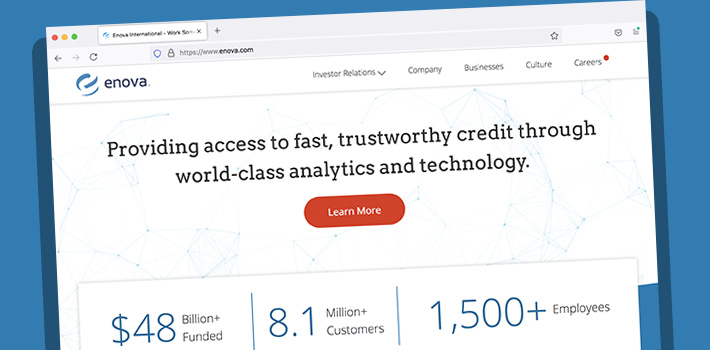Archive for 2023
PayPal Pulls Back on MCAs and Business Loans
November 2, 2023PayPal’s merchant cash advance and small business loan originations in 2023 are down significantly from 2022. The company revealed that it had only purchased $1.3B in merchant receivables for the first 9 months of this year versus $2.3B over the same period last year.
In the earnings call, Acting CFO Gabrielle Rabinovitch said that the company is maintaining a “tightened origination strategy for the PayPal business loans portfolio.”
Charge-offs are up. “The increase in the charge-offs for the nine months ended September 30, 2023 compared to the same period of the prior year was due to the expansion of acceptable risk parameters in 2022, which resulted in a deterioration of the overall credit quality of loans outstanding,” the company disclosed.
Fintech Hasn’t Stopped. There’s Still Room for Constant Improvement in Lending
October 31, 2023 “I think fintech is a broad term,” said Frank McKenna, Chief Fraud Strategist at Point Predictive. “It can apply primarily to technology that enables faster banking, and more digital banking that hasn’t been satisfied with kind of the traditional brick and mortar banks or finance companies. Fintech can be banks, it can be platforms that provide the backbone for that kind of streamline lending. Or it can even be considered companies like ours, technology that helps financial companies make better decisions.”
“I think fintech is a broad term,” said Frank McKenna, Chief Fraud Strategist at Point Predictive. “It can apply primarily to technology that enables faster banking, and more digital banking that hasn’t been satisfied with kind of the traditional brick and mortar banks or finance companies. Fintech can be banks, it can be platforms that provide the backbone for that kind of streamline lending. Or it can even be considered companies like ours, technology that helps financial companies make better decisions.”
Fintech, which can take on any one of the forms McKenna described, has been causing transformations for over a decade and yet there are still processes in the lending world still ripe for improvement.
“[Fintech is] growing every day, it will be more because of timing,” said Richard Gusmano, CEO of BCCUSA. “I think we’re going to see more and more people doing it, especially with the SBA opening up lending to non-banks. You’re going to see more of it in many different fashions and derivatives and how they see it is going to continue to emerge.”
Gusmano’s company helps businesses secure bank lines and bank loans, a system that now includes its very own AI-powered solution. He’s already seeing how AI and machine learning technologies stand to disrupt processes in the small business finance ecosystem.
“There’s so many different ways to use it and it is not rocket science,” Gusmano said. “In the MCA space, it’s amount of deposits, it’s average daily balance, it’s business type, and other positions. AI can immediately pick up those things if programmed to do so. I would think that the MCA underwriters over time should be concerned because AI could likely do that and pick that up.”
But it’s not just about replacing manual processes, but also doing it in an efficient manner.
“Since most fintech is dealing in a non-face to face environment, you’re going to have a whole host of risk in fintech, more than you might have in a traditional bank,” said McKenna of Point Predictive, whose company collaborates with lenders to detect potential risks. “I can just name off five or six: you have higher rates of identity theft, use of fake IDs called synthetic identities, you have more falsified documentation, fake employers, people shot-gunning where they’ll go to multiple fintechs the same day and get as many loans as they can, as quick as they can. They call it shot gunning.”
McKenna added that if someone has no knowledge of how to navigate these types of strategies or does not have the right technology to handle it, they may fall victim to them.
The keyword there might be someone, as in a person
“The risks associated is that you still are going to need someone that can make human decisions, even with financial technology,” said Gusmano. “And if you don’t, you’re going to be keeping yourself away from businesses that you want to do business with. It can never be 100% tech.”
Amazon’s Business Loan Program Relatively Flat, And The Company is Now Possibly the Largest MCA Broker?
October 29, 2023 Amazon’s seller lending program, in which the company extends working capital loans to Amazon sellers to buy inventory, has been somewhat flat this year. Its seller lending receivables in Q3 were unchanged from Q1, coming in at $1.2B. It had briefly gone up in Q2 to $1.3B.
Amazon’s seller lending program, in which the company extends working capital loans to Amazon sellers to buy inventory, has been somewhat flat this year. Its seller lending receivables in Q3 were unchanged from Q1, coming in at $1.2B. It had briefly gone up in Q2 to $1.3B.
Amazon rarely mentions its seller lending business which is but a blip compared to the $143B in net sales the company recorded in just the third quarter. Despite all this cash, Amazon relies on a $1.5B secured revolving credit facility with a lender in the same way many small business lenders do to facilitate this amount of loan volume.
deBanked has been tracking the company’s seller lending receivables balance since 2016.
Amazon’s separate merchant cash advance program is not counted as part of their selling lending program. Amazon partnered up with Parafin in November 2022 to offer MCAs to their clients. One consequence of that is that Amazon sellers talk publicly in the company’s Seller Central forums and this has been no exception. There, most mentions of Parafin have so far been less than flattering.
Much of the confusion reported by sellers is centered around the percentage collected from each sale. Unlike most MCA funding companies, which either withhold a percentage of card sales or debit a fixed daily amount that can later be trued-up upon request, Amazon was previously collecting its percentage “based on whether a seller had received any disbursements, automatic or manual, in the prior week.” However, that changed this past August, according to Amazon who published the following note in their forum:
Payment is deducted from your bank account based on your current Amazon disbursement schedule. If you receive disbursements weekly, payments for your cash advance will be deducted weekly. If you receive disbursements bi-weekly, payments for your cash advance will be deducted bi-weekly. In instances where Amazon sales data is delayed in reaching Parafin, Parafin combines the payment amount with the subsequent payment to avoid debits happening on unexpected days of the week. Sellers whose payments are impacted by these instances receive emails from Parafin detailing the expected payment dates and adjusted amounts.
…
“Your merchant cash advance will be paid off automatically over time as you make successive sales-based payments. Because your offer is determined in part by your past business performance, our estimate is that you’ll pay your merchant cash advance within the estimated timeframe stated when you accepted it. If your sales ramp up or slow down, your payment amounts (and therefore the estimated payment period) may ramp up or slow down with them. The payment rate itself will not change and is a fixed percentage of monthly sales.”
Although there is some irony to Amazon playing the role of MCA broker and MCA customer service, Amazon also refers its loan-interested sellers to Lendistry and Marcus by Goldman Sachs. All of this activity started late last year just as Amazon was on pace to max out its own credit facility with its own lending program. Since then, the company’s flat business loan receivable balance might suggest that Amazon’s seller financing business is actually growing, just not on its own balance sheet since its brokering the deals out.
So who’s the biggest MCA broker in the US? Amazon generated $514B in net sales in 2022. $1B in MCA deals wouldn’t be so hard for a company already doing about a billion a year in loans. It would be quite ironic to discover that the biggest MCA broker in 2023 was Jeff Bezos, but it’s a real possibility.
Two Commercial Financing Bills Introduced in Pennsylvania
October 28, 2023 Add Pennsylvania to the list of states with commercial financing bills. Last week, Representative Kristine C. Howard introduced HB1791 and HB1972, which would outlaw Confessions of Judgment provisions in contracts and require mandatory disclosures to businesses respectively. In the latter, commercial financing providers would be required to disclose the total amount of funds provided, the total dollar cost of the financing, the term or estimated term, the payment method/frequency, prepayment policy, and APR.
Add Pennsylvania to the list of states with commercial financing bills. Last week, Representative Kristine C. Howard introduced HB1791 and HB1972, which would outlaw Confessions of Judgment provisions in contracts and require mandatory disclosures to businesses respectively. In the latter, commercial financing providers would be required to disclose the total amount of funds provided, the total dollar cost of the financing, the term or estimated term, the payment method/frequency, prepayment policy, and APR.
The bills were expected. Rep. Howard pledged to introduce them back in February when she circulated a memo titled “Protecting Small Businesses from Predatory Lending.“
ELFA Wins Nationwide Relief from Section 1071 for Equipment Finance Industry
October 26, 2023 WASHINGTON, D.C., October 26, 2023 – In a major victory for members of the Equipment Leasing and Finance Association and the entire equipment finance industry, today the U.S. District Court for the Southern District of Texas issued a nationwide injunction delaying implementation of Section 1071 for all covered financial institutions. This action is in direct response to the efforts of ELFA and the other parties that intervened in the case in recent months. Functionally this means that the deadlines for compliance with Section 1071 are delayed by approximately 10 months for all ELFA member companies.
WASHINGTON, D.C., October 26, 2023 – In a major victory for members of the Equipment Leasing and Finance Association and the entire equipment finance industry, today the U.S. District Court for the Southern District of Texas issued a nationwide injunction delaying implementation of Section 1071 for all covered financial institutions. This action is in direct response to the efforts of ELFA and the other parties that intervened in the case in recent months. Functionally this means that the deadlines for compliance with Section 1071 are delayed by approximately 10 months for all ELFA member companies.
In response to the Court Order, ELFA President and CEO Ralph Petta said, “This is a big win for ELFA members and the equipment finance industry as a whole. We applaud the action taken by the court today, which underscores the value of our association’s ongoing efforts to ensure Section 1071 doesn’t make it more burdensome for our members and their customers in the $1 trillion equipment finance industry to do business together.”
Earlier this year the court had issued a partial injunction in response to litigation filed by Rio Bank, the Texas Bankers Association and the American Bankers Association. That initial injunction had, until that point, only covered those three entities. In August ELFA intervened in the lawsuit to ensure that the initial relief provided by the judge would apply equally to all ELFA members.
The action taken by the court today broadens the injunction to delay implementation of Section 1071 for all financial institutions covered by the rule. The delay will last until the Supreme Court issues a decision in a different, but related, case. The Supreme Court decision is expected in the spring/summer timeframe of 2024. This means that compliance will likely now be pushed out approximately 10 months from all the dates published in the original rule.
ELFA has been working for over a decade to improve Section 1071. The association has been proactively engaged in both the legislative and regulatory arenas to defend its members’ interests and reduce the measure’s onerous reporting regulations. Section 1071 is a part of the Dodd-Frank Act, which when implemented by the Consumer Financial Protection Bureau (CFPB) will require commercial finance companies to collect information about credit applicants and report it to the CFPB on an annual basis, along with extensive financial data associated with the application’s disposition, including extensive pricing information.
The “Order Granting Intervenors’ Motions for Preliminary Injunction” is available on the ELFA website at https://www.elfaonline.org/1071. ELFA will be sharing more information with its members in the coming days and weeks about the implications of this ruling.
About ELFA
The Equipment Leasing and Finance Association (ELFA) is the trade association that represents companies in the $1 trillion equipment finance sector, which includes financial services companies and manufacturers engaged in financing capital goods. ELFA members are the driving force behind the growth in the commercial equipment finance market and contribute to capital formation in the U.S. and abroad. Its 580 members include independent and captive leasing and finance companies, banks, financial services corporations, broker/packagers and investment banks, as well as manufacturers and service providers. ELFA has been equipping business for success for more than 60 years. For more information, please visit www.elfaonline.org.
Media/Press Contact: Amy Vogt, Vice President, Communications and Marketing, ELFA, 202-238-3438 or avogt@elfaonline.org
Nice Yacht, Someone Financed It
October 26, 2023 Every sentence sounds better ending with the word “yacht.” Enjoying crackers and cheese on a yacht. Sipping champagne aboard a luxurious yacht. Even making money financing high-end yachts, the charm remains intact. Over the past six years, East Harbor Financial has been offering a range of financing solutions under their Luxury Assets category, which includes exotic cars, aircraft, and vessels. While the company has been in business for 11 years, President Bruno Raschio’s foray into the yacht industry provides a unique perspective from an outsider turned insider.
Every sentence sounds better ending with the word “yacht.” Enjoying crackers and cheese on a yacht. Sipping champagne aboard a luxurious yacht. Even making money financing high-end yachts, the charm remains intact. Over the past six years, East Harbor Financial has been offering a range of financing solutions under their Luxury Assets category, which includes exotic cars, aircraft, and vessels. While the company has been in business for 11 years, President Bruno Raschio’s foray into the yacht industry provides a unique perspective from an outsider turned insider.
According to Yatco.com, there are currently 592,000 yachts in the United States and the global market size was valued at $8.91 billion in 2022, with expectations to expand 5.8% from 2023 to 2030. The most Raschio has ever financed on one unit was $2 million and he admits there is a lot of money to be made in this sector, but people must be willing to welcome the risk that comes with it.
“Lenders who embrace risk and identify a specialized market can consistently generate profits in a business,” said Raschio. “Nonetheless, market corrections often possess the capability to level out the gains amassed during prosperous years.”
Raschio emphasized that the industry has many brokers that do not necessarily need an in-depth knowledge on yachts. Nevertheless, the significance of understanding yachts itself is always advantageous. In the case of private lenders, like his own company, Raschio advised focusing on financing high-quality yachts that possess strong market appeal and retain their value.
With the increase in manufacturing costs, Raschio states that prices may not revert to pre-Covid rates, like when they initially joined the yacht industry. For instance, A-credit rates, which used to range from 4½ to 5% before the pandemic, have now risen to 8 to 9%. Similarly, rates for B, C, and D credit ratings, previously between 10 to 13%, have surged to 14 to 19%.”
 “Consider this scenario, if you were buying a million-dollar yacht before, you’d typically put down 30%, leaving you with a financing amount of $700,000,” he said. “However, in a post-Covid market, if the same yacht is selling for $1.5 million and you still put down 30%, you’d be looking at financing $1,050,000. That means you’re financing nearly $50,000 more than its pre-Covid value.”
“Consider this scenario, if you were buying a million-dollar yacht before, you’d typically put down 30%, leaving you with a financing amount of $700,000,” he said. “However, in a post-Covid market, if the same yacht is selling for $1.5 million and you still put down 30%, you’d be looking at financing $1,050,000. That means you’re financing nearly $50,000 more than its pre-Covid value.”
East Harbor specializes in financing high-end yachts, brands like Sunseeker, Azimut, Ferretti, Pershing, and Princess. Transactions typically range from $600,000 to $1 million, covering yachts that fall within the 40 to 75-foot size range. Working with clients nationwide, the primary regions where the company provides financing are South Florida, which is the largest market, California’s Newport Beach, the second largest, and various areas along the east coast, the third-largest market. The company exclusively offers short-term loan options, typically lasting between 5 to 8 years, as opposed to the more common 15 to 20-year loan terms for yachts.
“We prefer to expedite our financing process since we rely on private funding,” Raschio explained. “Furthermore, this type of financing is generally costlier than traditional bank loans. Therefore, many individuals find it more sensible to present it as a short-term solution, where you secure your financing, achieve your objectives, and exit, or sell the boat.”
Upon entering the boat financing business, Raschio first’s client came to him with a million-dollar yacht with a $500,000 down payment. It seemed like a solid deal, but there was also a high likelihood that the yacht was going to need very expensive repairs. Its details like this that can change the entire dynamics of the deal and it was a teaching moment for him.
“As an example, a major repair on a used yacht that’s heavily depreciated could cost more than the entire used yacht price,” said Raschio.
Enova Discussed Its Q3 Performance, Its View on the Small Business Loan Market
October 24, 2023 Enova originated $783M in small business loans in Q3, which is up from $770M in Q1 and $712M in Q2. Overall company profitability was slightly down but mainly because they increased marketing spend later in the quarter in which there was not enough time to also experience the corresponding revenue increase.
Enova originated $783M in small business loans in Q3, which is up from $770M in Q1 and $712M in Q2. Overall company profitability was slightly down but mainly because they increased marketing spend later in the quarter in which there was not enough time to also experience the corresponding revenue increase.
Enova also recorded some slightly higher-than-expected chargeoffs that came from their 2nd half 2022 smb loan vintages.
“As you would expect, our underwriting models adjusted based on this data and vintages since January of this year are back in line with our expectations,” said Enova CEO David Fisher on the earnings call. “But since there is a 9 to 12-month emergence period for charge-offs in our small business products, charge-offs from those second half 2022 vintages were at their peak in Q3 of this year.”
Given the current interest rate environment, the call drew out some insightful information about the small business loan market. Bullet points below:
- “…while prime and super prime borrowers are facing higher interest expense due to the increase in the Fed funds rate, we have not raised our pricing.” – Fisher
- “I think the competitive environment is still pretty benign, like we’ve been talking about for a while. Nothing new on the small business side. I think we’ve seen, as we talked about, competitors struggle with liquidity, also a couple move more towards the prime space in SMB.” – Fisher
- “On the small business side, still a lot coming through the wholesale channel through ISOs, but we continue to grow our direct channel. It’s a very fast-growing channel for us” – Fisher
- “So if the consumer falls on their face, small businesses are in big trouble. We saw that during COVID, but if the consumer is still spending and doing well, the small businesses tend to be a big beneficiary of that incremental spend.” – Fisher
- “While there’s a lot of uncertainty in the economy today, both internal and external data lead us to believe that both our consumer and small business customers are navigating it well.” – Fisher
- “Inflation continues to moderate, while the labor market and wage growth continue to be very strong.” – Fisher
- “To be clear, Enova overall is in great shape, and we’re feeling good about Q4 and next year.” – Fisher
ELFA Announces Leigh Lytle as New President and CEO
October 23, 2023 PHOENIX, ARIZONA, October 23, 2023 – The Equipment Leasing and Finance Association (ELFA) today announced the appointment of Leigh Lytle as President and CEO, effective Dec. 4, 2023. ELFA Board Chair Bob Neagle made the announcement this morning at the General Session of the 62nd ELFA Annual Convention in Phoenix, Arizona. Lytle will succeed Ralph Petta, who is retiring from the association at the end of the year.
PHOENIX, ARIZONA, October 23, 2023 – The Equipment Leasing and Finance Association (ELFA) today announced the appointment of Leigh Lytle as President and CEO, effective Dec. 4, 2023. ELFA Board Chair Bob Neagle made the announcement this morning at the General Session of the 62nd ELFA Annual Convention in Phoenix, Arizona. Lytle will succeed Ralph Petta, who is retiring from the association at the end of the year.
“We are pleased to welcome Ms. Lytle to ELFA as our new President and CEO,” said Neagle. “Leigh is a dynamic leader whose experience, passion and vision make her uniquely qualified to guide our association into the future. Her experience in banking, operations, advocacy and education, and most recently with a fintech company and a fintech trade association, will add momentum to our current ELFA efforts in those same areas. After conducting a national search, we are delighted with this outcome and the opportunity it offers our organization. I would like to thank our search committee for their tremendous work throughout the process.”
As the Head of North American Policy at Plaid, Lytle led education and engagement efforts with regulators and financial institutions. In this role, she advocated for protecting consumers’ rights within the digital financial ecosystem and in Washington, D.C. She also served as the Chair of the Board of Directors of the Financial Technology Association (FTA), which represents innovative companies shaping the future of finance. The industry trade group champions the power of technology-centered financial services and advocates for the modernization of financial regulation to support inclusion and responsible innovation. Before joining Plaid, Lytle spent over 15 years in the Federal Reserve Bank system in various executive roles ranging from engagements in monetary and regulatory policy to operations and data analytics oversight.
“I am honored to be joining the Equipment Leasing and Finance Association as the organization moves into its next phase and navigates the digital landscape and abundant opportunities on behalf of our members,” said Lytle. “The association has an incredible board, members and team championing this critical sector that adds tremendous value to the American economy. I am proud to join the ELFA staff to build on the solid foundation established by Ralph Petta and the team, and look forward to meeting with and working with our members in the coming months.”
About ELFA
The Equipment Leasing and Finance Association (ELFA) is the trade association that represents companies in the $1 trillion equipment finance sector, which includes financial services companies and manufacturers engaged in financing capital goods. ELFA members are the driving force behind the growth in the commercial equipment finance market and contribute to capital formation in the U.S. and abroad. Its 575 members include independent and captive leasing and finance companies, banks, financial services corporations, broker/packagers and investment banks, as well as manufacturers and service providers. For more information, please visit www.elfaonline.org.
###
Media/Press Contact: Amy Vogt, Vice President, Communications and Marketing, ELFA, 202-238-3438 or avogt@elfaonline.org





























